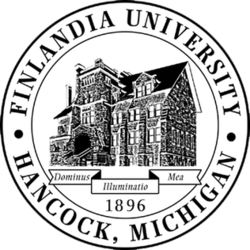History
Finlandia University was founded as Suomi College on September 8, 1896, by J. K. Nikander (b. 1855, Hämeenlinna, Finland, d. 1919). [7] [9] During the 1880s, large numbers of Finns immigrated to Hancock, Michigan to labor in the copper and lumber industries. As a mission pastor of the Finnish Evangelical Lutheran Church of America headquartered in Hancock, Nikander observed that Swedish and Finnish immigrants along the Delaware River did not train new ministers, and he feared a loss of Finnish identity. The college's role was to preserve Finnish culture, train Lutheran ministers and teach English. During the 1920s, Suomi College became a liberal arts college and in 1958, the seminary separated from the college. On July 1, 2000, Suomi College changed its name to Finlandia University. [9] [10]
The cornerstone of Old Main, the first building erected at Suomi College, was laid on May 30, 1898. Jacobsville sandstone, quarried at the Portage Entry of the Keweenaw waterway, was brought by barge, cut, and used to construct the Old Main. Dedicated on January 21, 1900, it contained a dormitory, kitchen, laundry, classrooms, offices, library, chapel, and lounge. A marker designating the college and its Old Main building as Michigan Historic Sites was erected by the Michigan Historical Commission in 1991. [11]
The burgeoning college quickly outgrew this building. In 1901 a frame structure, housing a gym, meeting hall, and music center, was erected on an adjacent lot. The frame building was demolished when Nikander Hall, named for Suomi's founder, was constructed in 1939. The hall was designed by the architectural firm of Eliel Saarinen and J. Robert F. Swanson. In addition to Old Main, the present day main campus consists of Nikander Hall, Mannerheim Hall, Wargelin Hall, Finlandia Hall, the Paavo Nurmi Center for Physical Education, the Kivi House, Hoover Center, the Finnish American Heritage Center, the Chapel of St. Matthew, and the Jutila Center.
Finlandia University was affiliated with the Lutheran church since its inception and in 1988, became affiliated with the Evangelical Lutheran Church in America. The curriculum, campus events, and the community explored the value of faith, vocation, and service. Finlandia University was accredited by the Higher Learning Commission of the North Central Association for Colleges and Schools. In 1996, the university transitioned from a two-year college to a four-year university. [10] Starting with the 2020–21 academic year, Finlandia's admissions policy contained no requirements for SAT or ACT scores, only requiring a secondary school transcript. [12]
In 2022, Philip R. Johnson was succeeded by Timothy Pinnow as the institution's president. [13] On March 2, 2023, Timothy Pinnow announced that Finlandia University would close after the spring 2023 semester. Pinnow cited a lack of interest in enrollment and the debt load of the university as factors in shutting down operations.
The university's board of trustees voted on March 14, 2023, to officially dissolve the university. Finlandia also announced that some staff had been laid off to free up funding for operations related to student transfers. They also announced that all other staff would be laid off following commencement. [14]
The university set up agreements for students to finish their education at Michigan Technological University, Bay de Noc Community College, Adrian College, Wartburg College, Northern Michigan University and a few other colleges. [8]
Athletics
There were 12 NCAA Division III athletic sports at Finlandia, whose teams were known as Lions, competing primarily as a member of the Coast to Coast Athletic Conference (C2C) since 2020. [19] Women's athletics included: basketball, cross country, golf, ice hockey, soccer, softball and volleyball. Men's athletics included baseball, basketball, cross country, football, golf, ice hockey and soccer. Co-ed Esports were added as varsity-level sports in the 2020–2021 season. [20]
Finlandia University's football team played its first season in the Fall of 2015. From 2015 to 2017, they played football in Division III as an independent. For the 2018 and 2019 seasons, Finlandia competed in the Michigan Intercollegiate Athletic Association. After they did not play during the 2020 season due to the COVID-19 pandemic, they joined the Upper Midwest Athletic Conference for the 2021 and 2022 seasons. Over seven seasons, the team compiled a 5–56 record, scoring 575 points and having 2,711 points scored against for an average of 45 points per game. [26] [27] [28]
Ice Hockey
Finlandia University had both men's and women's Division III ice hockey teams. The men's team played their first season beginning in 2001, and the women's beginning in 2004. They played their games at Houghton County Arena. From 2004 to 2013, they played in the Midwest Collegiate Hockey Association conference, and from 2013 to 2023 in the Northern Collegiate Hockey Association conference. From 2004 to 2023, the men's team compiled a record of 105–279–19. In the 2007–2008 season, the team compiled a 14–6 record and defeated Milwaukee School of Engineering to be crowned MCHC Champions. [29] [30] [31]





